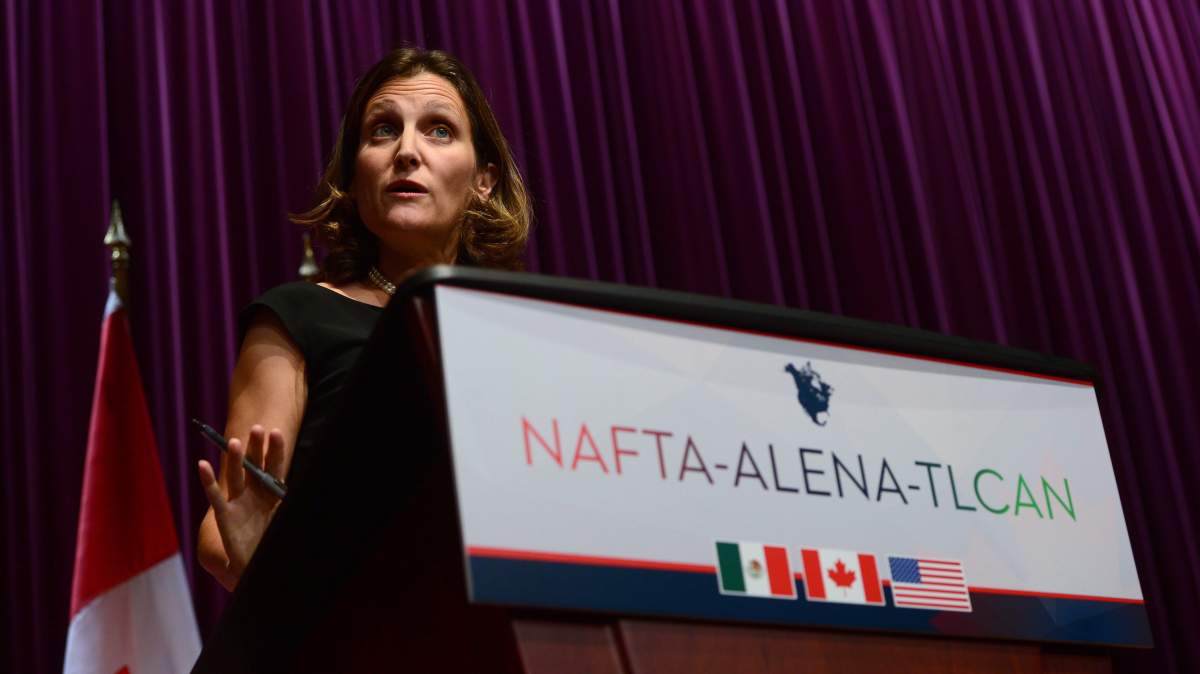While trade tensions between the countries might be rising, a new study suggests Americans hold an overwhelmingly positive view of the commercial relationship with Canada and that the opinion is a rare matter of partisan consensus, shared by people warm, cold, and ambivalent towards President Donald Trump.

The finding was embedded in a study presented in Washington on Monday, the same day the U.S. pushed ahead an international case against Canadian wine rules, and a week after massive duties were slapped on Bombardier planes.
Coverage of NAFTA on Globalnews.ca:
The annual survey by the Chicago Council on Global Affairs measured opinions on the president’s so-called America First policies and found dramatic splits on a series of international issues, where core Trump supporters were isolated from other Republicans, Independents and Democrats.
But trade with Canada was an exception.
No less than 79 per cent of U.S. respondents said Canada trades fairly with their country – with that feeling shared by self-identified core Trump supporters (73 per cent), Trump-skeptical Republicans (75 per cent), Independents (79 per cent), and Democrats (83 per cent).
READ MORE: U.S. wants to give Canadian companies same access to their market as Bahrain, Freeland confirms
That was warmer than views on trade with Europe, Japan, and South Korea, and significantly higher than for trade with the other country now involved in renegotiating NAFTA: only 47 per cent expressed the same attitude about Mexico.

Get breaking National news
Results on NAFTA point to a broader pattern of the survey.
While 53 per cent agreed NAFTA was good for the economy, the breakdown showed 70 per cent of Democrats agreeing, along with 49 per cent of Republicans who were less enthusiastic on Trump, and just 20 per cent of self-described staunch Trump supporters agreeing.
It’s a pattern that repeated itself on other international issues where it was Trump’s core supporters versus the majority of the country. The president of the Chicago Council pegged the core Trump supporters at 25 to 30 per cent – he said they consistently see world issues differently from the rest of the country.
“(That’s the) striking finding overall,” said Ivo Daalder, president of the Chicago Council, presenting the findings at Washington’s Wilson Center on Monday.
“There are differences between Democrats, and Republicans, and Independents, but those differences are all much smaller than the differences between them and the core Trump supporters. That’s the key. ‘America First’ is resonating with those who have a highly favourable view of the president.”
But he said that view is not winning majority support in the country.
READ MORE: Jean Chretien says Canada better positioned to renegotiate NAFTA
In fact, the annual study found what it called a record level of support for international trade – with 78 per cent of respondents calling trade good for American consumers, 72 per cent called it good for the economy, and 57 per cent called it good for job-creation.
Democratic respondents were most pro-trade, and Republicans most negative – a disconnect from the pattern in the U.S. Congress, where the Republican leadership is pro-trade and the Democratic leadership is somewhat aligned with Trump’s trade-skepticism.
“There are two wings in each party. And there have been for years,” said Jane Harman, a former legislator who calls herself a pro-trade Democrat, and now heads the Wilson Center.
“It has been always difficult – certainly more difficult in the last 10 years – to put those wings together to get support for trade agreements.”
The turbulence on trade has been especially noticeable lately.
The U.S. government touts a 48 per cent increase from last year in anti-dumping and countervailing cases initiated by the Department of Commerce. It just announced 220-per-cent duties against Bombardier, following a complaint from Boeing.
READ MORE: ‘Substantial challenges’ still ahead after 3rd round of NAFTA talks
On Monday, the U.S. filed a second complaint with the World Trade Organization against Canada over British Columbia rules favouring domestic wines on store shelves, which is the subject of a long-standing complaint that began under the Obama administration, which also alleged the rules were discriminatory.
The countries have just completed their third round of NAFTA negotiations. Insiders briefed on the substance of recent rounds say the countries have encountered a series of early irritants, pointing to tough negotiating ahead.
The Chicago Council surveyed 2,020 Americans and found:
- Strong majority support for NATO (69 per cent). Most respondents (59 per cent) agreed the U.S. should remain committed even if other countries don’t boost defence spending, although the most pro-Trump respondents felt differently (38 per cent said stay).
- On immigration, 76 per cent favoured allowing millions of undocumented people to stay in the U.S. Only 22 per cent said they should be forced to leave. Core Trump supporters were the least favourable – 54 per cent said stay, 45 per cent leave.
- On climate change, 62 per cent said the U.S. should remain in the Paris agreement, including 53 per cent of non-Trump Republicans versus 23 per cent of Trump Republicans.
- Toronto Stock Exchange plunges due to massive precious metals sell-off
- Bombardier warns of ‘significant impact’ to travellers from Trump’s threat
- Can Trump decertify aircraft? What experts say amid Bombardier threat
- Stepfather of two missing N.S. kids charged with sexual assault of adult, forcible confinement













Comments